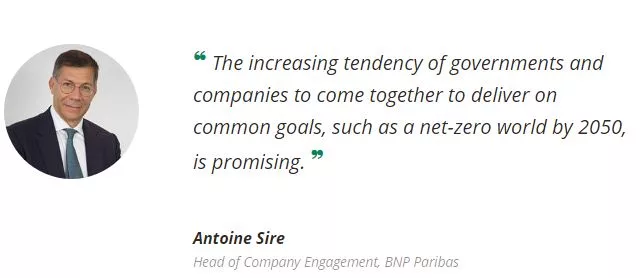Increased international cooperation is supporting the transition to a more sustainable economy.
A recent event “A Transatlantic Perspective: When Sustainability Meets Geopolitics”, co-hosted by BNP Paribas, Goldman Sachs and the French-American Foundation, pointed to cautious optimism about the transition to a sustainable global economy.
Some positive long-term outcomes lie ahead, despite near-term threats such as the possibility of an economic recession and the uncertainties of an evolving geopolitical environment. In particular, participants cited a growing sense of collaboration between the United States and Europe and among companies in such areas as green technology, minerals and finance.
The two regions recently announced reinforced efforts to build the clean energy economies of the future and ensure diversified, secure clean energy supply chains. These initiatives notably include the diversification of mineral and battery supply chains. Pledges were also made previously to build clean and renewable hydrogen ready infrastructure.

Renewed optimism
The re-entry of the United States into the Paris Agreement is fuelling optimism about the ability of different parties to work together to mitigate the effects of climate change. The Inflation Reduction Act (IRA) can be a true game changer in terms of US energy transition. The programme earmarks US$370 billion for investments in the clean energy transition and energy security, with funding also set aside for carbon capture, utilisation and storage (CCUS) projects. Guidance may, however, still be needed to help entities comply with its principles. A US-EU Task Force is in place to further cross-Atlantic cooperation in this area.
The EU too is developing its own approaches, with programmes like the Green Deal, Fit for 55 and REPowerEU to pursue the energy transition and reduce greenhouse gas emissions. The Green Deal includes the Green Deal Industrial Plan designed to increase the technological development, manufacturing production and installation of net-zero products and energy supply in the next decade.
Reconciling environmental and social goals
Another key component of the global energy transition will be reconciling environmental objectives with social goals. Green hydrogen technology and the construction of offshore wind farms are seen as highly promising ways to pursue net zero. Green hydrogen, produced through electrolysis, by splitting water (H2O) into hydrogen (H2) and oxygen (O2) using renewable electricity sources, is broadly viewed as a viable alternative to fossil fuels. While challenges remain on cost and storage, the United States recently announced a new national clean hydrogen strategy and roadmap, and the European Union aims to produce 10 million tonnes and import 10 million tonnes of renewable hydrogen in the EU by 2030.
Not all countries will have the same investment capabilities, facing the choice between investing scarce funds in economic growth or these new technologies. Yet the increasing tendency of governments and companies to come together to reach such goals as a net-zero world by 2050 is a promising sign, according to Antoine Sire, Head of Company Engagement at BNP Paribas.
In summing up the event, he discussed three essential points to remember in the global effort to mitigate the effects of climate change:
- Security. The global energy crisis spotlights the need for energy security. Given current geopolitical uncertainties, there is a need to rethink our energy systems and aim for energy security and independence. The way forward is clear – countries must pursue the energy transition as a means to build energy security.
- Innovation. There is no contradiction between profitability and the transition to clean energy. Company leaders fully understand that both financial success and sustainability demand innovation. The real dilemma is managing through near-term challenges while working toward long-term solutions.
- A just transition to renewable energy. The energy transition is only successful if it is built on a just transition that benefits society as a whole. Imbalances within and between countries must be addressed, and as such governments and international bodies must take on board economic, environmental and social consequences. “It’s very important that the transition leaves no one behind,” said Antoine Sire, “it’s a question of justice.”

